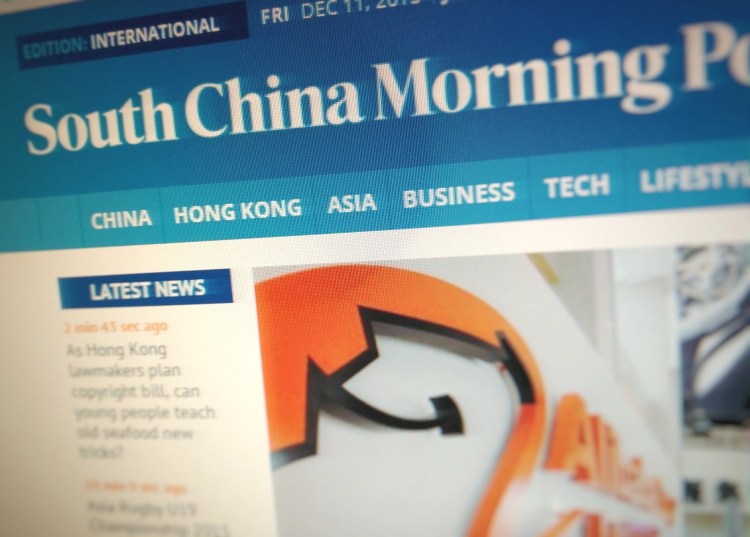Want smarter insights in your inbox? Sign up for our weekly newsletters to get only what matters to enterprise AI, data, and security leaders. Subscribe Now
After weeks of speculation, China-based ecommerce giant Alibaba has confirmed it is entering the media business with the acquisition the Hong Kong-based publication the South China Morning Post (SCMP).
In what is thought to be a $100 million transaction, Alibaba is buying the media assets of one of the region’s most influential English-language titles, one that isn’t subject to China’s notorious state censorship.
In the SCMP‘s own report of the news today, Alibaba insists that the newspaper, which has a print circulation of around 100,000, will maintain editorial control. “Even though we are the corporate owner, we will let the editors decide the editorial policy and direction of coverage for any story. That’s our basic principle,” explained Joseph Tsai, executive vice chairman at Alibaba.
However, it seems the motive for the purchase is more about influencing the West’s perception of China, where Alibaba is based.
“Our business is so rooted in China, and touches so many aspects of the Chinese economy, that when people don’t really understand China and have the wrong perception of China, they also have a lot of misconceptions about Alibaba,” added Tsai, in an interview with the New York Times. “What’s good for China is also good for Alibaba.”
Tsai referred to the “bias lens of Western media” outlets, which he said influences how others outside China, including investors, perceive Alibaba. The company, which trades on the New York Stock Exchange, said that negative reports about China are affecting its shares.
On the surface, it seems as though Alibaba is trying to buy positive press coverage through controlling one of the few newspapers in the region that has any kind of international readership. And to help the company in its mission, it is bringing down the SCMP‘s paywall, which has been in place for around ten years. Tsai also added that Alibaba will invest more in the SCMP‘s newsroom, “particularly in its digital operation.”
While Alibaba has been fairly open about its main motives for acquiring the newspaper, they do sit in stark contrast with its claim to allow the publication full editorial independence. The SCMP has been critical of the Chinese regime, and it’s that kind of reporting, according to Tsai, that is damaging to all parties associated with the country — including Alibaba.
Given that the newspaper is known for its independent coverage of China, and Alibaba has significant business interests in China, isn’t there a conflict of interests here? In a Q&A with the SCMP, Tsai addresses this question specifically. He said:
“We don’t see it that way. There are going to be situations when sensitive topics are being covered. But we think coverage should be objective, balanced and fair. That’s the principle. I don’t think there is anything wrong with seeing things from a certain perspective. Our perspective is this: China is important, China is a rising economy. It is the second-largest economy in the world. People should learn more about China. The coverage about China should be balanced and fair.
Today when I see mainstream western news organisations cover China, they cover it through a very particular lens. It is through the lens that China is a communist state and everything kind of follows from that. A lot of journalists working with these western media organisations may not agree with the system of governance in China and that taints their view of coverage. We see things differently, we believe things should be presented as they are. Present facts, tell the truth, and that is the principle that we are going to operate on.
Tsai’s focus on “balanced and fair” is key here. It seems that the acquisition could be used to combat negative reporting elsewhere, be it about China or Alibaba itself. This is backed up elsewhere in the Q&A, where Tsai said.
“But the one thing that I want to emphasise is that the coverage has to be objective and fair. We feel that as a company we have been subject to a lot of negative coverage, not by SCMP but by a lot of other organisations.”
It’s difficult to see how Alibaba can execute an “independent” editorial plan while maintaining its other stated mission of creating a more balanced (read: “favorable”) impression of China in English-speaking countries.
Alibaba isn’t the only technology giant to align itself with a newspaper. Amazon founder and CEO Jeff Bezos acquired the Washington Post for $250 million back in 2013. But it seems Bezos’ motive is more about trying to reinvent a legacy media brand for the Internet age, rather than directly trying to buy influence in the media (though the latter is an unavoidable outcome).
There’s also a more direct correlation to be drawn here between Alibaba’s acquisition and U.S. interests. Yahoo still owns a 15 percent Alibaba stake, a stake that’s said to be worth around $32 billion. So to appropriate Tsai’s words, what’s good for China and good for Alibaba, is also good for Yahoo.


